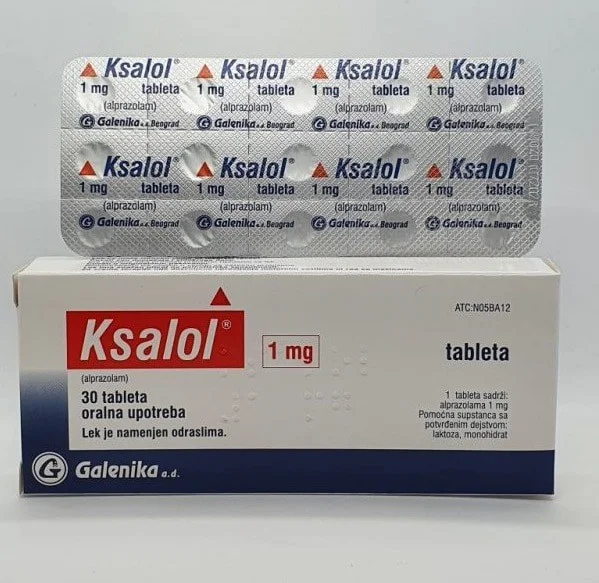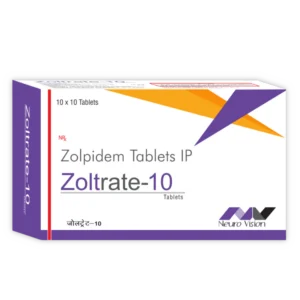Ksalol 1mg (Alprazolam): Uses, Dosage, Side Effects, and Precautions
Ksalol 1mg, which contains the active ingredient alprazolam, is a prescription medication commonly used to treat anxiety and panic disorders. As a member of the benzodiazepine class of drugs, Ksalol works by calming the central nervous system. It helps reduce feelings of anxiety, restlessness, and panic, making it a go-to medication for those struggling with these conditions. This article will provide a straightforward explanation of Ksalol 1mg, covering its uses, dosage guidelines, potential side effects, and necessary precautions.
What is Ksalol 1mg (Alprazolam)?
Ksalol 1mg is a medication that contains alprazolam, a benzodiazepine that affects the brain and central nervous system. It is often prescribed to treat conditions such as generalized anxiety disorder (GAD), panic disorder, and other related conditions. The medication works by enhancing the effects of a calming neurotransmitter in the brain called GABA (gamma-aminobutyric acid). This reduces the overactivity in the brain that leads to feelings of anxiety, fear, and panic.
Ksalol 1mg tablets contain 1mg of alprazolam per tablet. This dosage is generally suitable for individuals who require moderate relief from anxiety and panic attacks.
How Does Ksalol 1mg (Alprazolam) Work?
Alprazolam works by affecting the GABA receptors in the brain. GABA is the brain’s natural calming agent. It reduces the excessive activity of neurons, which can cause anxiety, agitation, and panic. By increasing the effects of GABA, Ksalol helps stabilize the brain’s activity, leading to a reduction in anxiety symptoms and the frequency of panic attacks.
After taking Ksalol, individuals typically begin to feel its calming effects within 1 to 2 hours, with the full effects lasting for several hours. Because of its fast-acting nature, Ksalol is particularly helpful for managing acute episodes of anxiety or panic.
Common Uses of Ksalol 1mg (Alprazolam)
Ksalol 1mg is primarily prescribed to treat:
-
Generalized Anxiety Disorder (GAD): This is a condition where a person experiences excessive, uncontrollable worry about everyday situations. Ksalol helps by calming the nervous system and alleviating the physical symptoms of anxiety such as muscle tension, restlessness, and irritability.
-
Panic Disorder: Panic disorder is characterized by recurrent and unexpected panic attacks, which can be debilitating. Ksalol reduces the intensity and frequency of these attacks by calming the mind and body during episodes of extreme fear or discomfort.
-
Short-Term Anxiety Relief: Ksalol may be prescribed for short-term relief of anxiety, particularly if other treatments have not been effective.
-
Sleep Disturbances Due to Anxiety: Although not the primary treatment, Ksalol can sometimes be prescribed to help manage sleep disturbances caused by anxiety.
Dosage of Ksalol 1mg (Alprazolam)
The dosage of Ksalol 1mg is determined by your doctor based on your symptoms, health status, and how well you respond to the medication. The typical starting dose for adults is:
-
For Generalized Anxiety Disorder (GAD): The usual starting dose is 0.25mg to 0.5mg, taken 2 to 3 times per day. This dose can be adjusted depending on the patient’s response.
-
For Panic Disorder: The starting dose is typically 0.5mg, taken 3 times daily. The dose may be increased gradually based on individual needs.
-
Maximum Dose: The maximum dose should not exceed 4mg per day, divided into multiple doses. Most individuals will find relief at much lower doses.
It is important to follow your doctor’s exact instructions when taking Ksalol. Never take more than the prescribed dose, as this increases the risk of severe side effects.
Side Effects of Ksalol 1mg (Alprazolam)
Like all medications, Ksalol 1mg can cause side effects. The most common side effects of alprazolam include:
- Drowsiness: One of the most common side effects of Ksalol is drowsiness, which can affect your ability to drive or perform tasks that require concentration.
- Dizziness: Some people feel lightheaded or dizzy, especially when standing up quickly.
- Fatigue: Ksalol may make you feel tired or less energetic.
- Memory Issues: Short-term memory problems or difficulty concentrating may occur.
- Coordination Problems: Some users may experience difficulty walking or maintaining balance.
While these side effects are usually mild and go away over time, serious side effects can occur. These include:
- Allergic Reactions: Signs of a severe allergic reaction include swelling of the face, lips, or throat, rash, and difficulty breathing. If you experience any of these symptoms, seek medical help immediately.
- Respiratory Depression: Ksalol can slow your breathing, especially when taken with other substances like alcohol, opioids, or other sedatives. This can be dangerous and may lead to life-threatening situations.
- Depression and Suicidal Thoughts: Benzodiazepines like Ksalol can increase the risk of depression and suicidal thoughts, particularly in people with a history of mood disorders.
- Dependence and Withdrawal: Long-term use of Ksalol can lead to physical dependence, and stopping the medication suddenly can result in withdrawal symptoms, including anxiety, sweating, and shaking. Your doctor may gradually reduce your dose if discontinuing the medication.
If any of these serious side effects occur, seek medical attention immediately.
Precautions and Warnings
Before taking Ksalol 1mg, inform your doctor if you have any of the following conditions:
- Allergic Reactions: If you are allergic to alprazolam or other benzodiazepines, you should not take Ksalol.
- Liver or Kidney Disease: Ksalol is processed in the liver and kidneys. If you have liver or kidney problems, your doctor may need to adjust your dosage.
- Pregnancy and Breastfeeding: Ksalol may harm an unborn baby and should not be used during pregnancy unless necessary. It is also passed into breast milk and may affect a nursing infant.
- Drug Interactions: Ksalol can interact with other medications, including opioids, alcohol, antidepressants, and certain antifungal or antibiotic medications. Inform your doctor about all medications you are taking to avoid potentially harmful interactions.
- Substance Abuse: Benzodiazepines like Ksalol can be habit-forming. If you have a history of substance abuse, discuss this with your doctor before starting treatment.
How to Take Ksalol 1mg (Alprazolam)
Ksalol 1mg should be taken exactly as prescribed by your doctor. It is usually taken by mouth with or without food. The tablets should be swallowed whole. Do not crush, chew, or break the tablet.
It is important to take Ksalol at the same time every day to help you remember. If you miss a dose, take it as soon as you remember, unless it is almost time for the next dose. Do not take two doses at once to make up for a missed dose.
Withdrawal and Dependence
Ksalol can cause dependence if taken for a long period. If you have been using Ksalol regularly, do not stop suddenly without consulting your doctor. Withdrawal symptoms may include anxiety, sweating, insomnia, and seizures. Your doctor will help you taper off the medication gradually to avoid these symptoms.
Conclusion
Ksalol 1mg (alprazolam) is an effective medication for managing anxiety, panic attacks, and other related disorders. It works by calming the nervous system, reducing the intensity of anxiety and panic symptoms. However, it can cause side effects, including drowsiness, dizziness, and dependence with long-term use. Always follow your doctor’s instructions for dosage and never exceed the recommended amount. If you experience any serious side effects, contact your healthcare provider immediately. Ksalol can significantly improve quality of life for those struggling with anxiety and panic disorders when used properly.









 USD $
USD $
 GBP £
GBP £